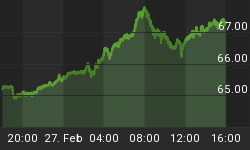January Crude Oil closed lower for the second consecutive week but losses could have been worse if not for a strong comeback on Friday. The primary reason for the weakness throughout the week was concern that the European debt crisis would trigger the start of a global recession. As bearish conditions spread throughout the Euro Region, traders pressured the Euro, driving up the U.S. Dollar and lowering demand for the dollar-based crude oil market.
The soft crude oil market firmed up on Friday on the news that violence had erupted in Saudi Arabia. With unrest already taking place in Egypt and Yemen, the news that it had spread to Saudi Arabia led to speculation that an escalation of events may destabilize the country. Egypt and Yemen are small players in the oil game while Saudi Arabia is the world's biggest crude oil exporter. Increased violence in this country would drive oil prices sharply higher on the fear that supply would be reduced.
Movement in the crude oil market is coming down to simple supply and demand analysis. If the Euro Zone problems continue to expand beyond the peripheral nations such as Greece, Italy and Spain then demand is likely to fall for crude oil, sending prices lower. "Risk-off" sentiment continues to drive investors into the U.S. Dollar, making crude oil more expensive to foreigners.
Since the markets are being driven primarily by the headlines from Europe and the Middle East, the impact of positive economic news from the U.S. has been diminished. This condition is likely to continue until Europe comes to a concrete agreement on how to manage its sovereign debt crisis. Up until now it's been "all talk and no action". Until this mind set changes, positive U.S. economic news is likely to have effect on the price of crude oil in my opinion. From now until the end of the year, Europe and other outside events are likely to set the tone in the market.
From a supply perspective this means that inventories are likely to remain high if Euro remains the key issue. If the emphasis shifts to the potentially explosive situations developing in the Middle East then the only thing that can be guaranteed is extreme volatility. What this market has come down to is this. If traders focus on Europe, the market is likely to weaken due to the stronger Dollar. If traders lean toward the possibility of supply disruptions in the Middle East then look for the market to rise.
In addition to the eruptions of violence in Egypt, Yemen and Saudi Arabia, traders shouldn't forget about Iran. Last week the U.S. announced a plan to sanction Iran because it is producing military grade uranium in its nuclear plants. Late in the week, France called for a European embargo on crude supplies. With Iran controlling the Strait of Hormuz, oil prices could soar if there is a military confrontation.
Factors Affecting Crude Oil This Week:
Supply and Demand: The U.S. supply and demand situation comes down to which set of fundamentals speculators decide to follow. If they follow the headlines out of Europe and decide to trade on a weaker Euro/stronger Dollar scenario, then look for oil prices to weaken. If the events in the Middle East escalate into full-blown confrontation then look for higher prices because of supply disruption concerns.
European Sovereign Debt: Last week Portuguese and Hungarian debt was downgraded to junk status. In addition, the European Central Bank's Italian bond buying campaign seems to have failed. With European leaders unable to come up with a plan to manage the spiraling debt situation, the problems are likely to worsen. Europe seems to be facing either a sovereign debt default or a major bank collapse. It is likely to be both. This would plunge the region into a recession and perhaps the world greatly lowering demand for crude oil.
U.S. Economy: If Europe falls, the U.S. is likely to face another recession. The Fed has done just about all it can to keep the economy afloat but there are some things it has no control over. U.S. economic news is not as important at this time and is not likely to move the market. Traders are focusing on Europe and the Middle East.
Middle East Conflicts: Egypt, Yemen, Saudi Arabia and Iran. What is it going to take to draw the U.S. into any one of these conflicts? While unlikely to move on the events in Egypt and Yemen, the U.S. has direct interests in Saudi Arabia and Iran. These scenarios have to power to drive oil prices sharply higher.
Source: http://oilprice.com/Energy/Oil-Prices/Crude-Oil-Analysis-for-the-Week-of-November-28-2011.html
By. Oilprice.com















